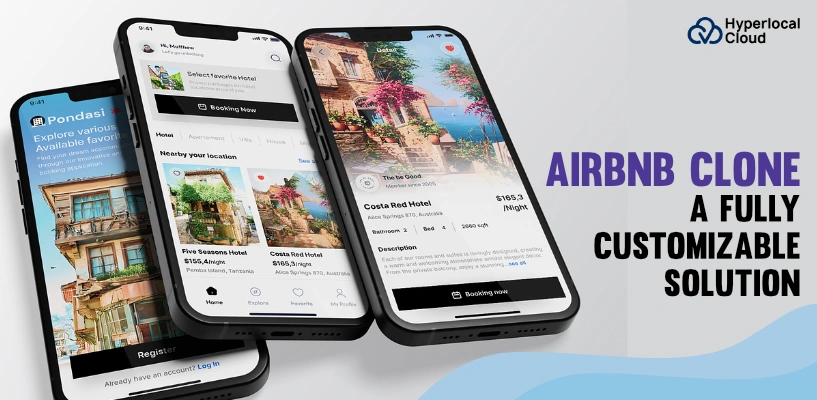Airbnb Clone | Build An App Like Airbnb

In recent years, we have seen that the travel and tourism industry has undergone a massive shift, especially in the vacation rental industry. Now, people prefer to choose unique stay options over traditional hotels. This is where various entrepreneurs are choosing to build platforms like Airbnb to offer excellent vacation rental booking services to travellers. A report says that the global vacation rental market will grow to $185 billion by 2030. giving entrepreneurs a great option to invest in this market and thrive. However, developing an app from scratch costs more, so they prefer its clone version. If you are one of those thinking of building an Airbnb clone, then reading this blog would help you. It explains its features, costs, revenue model, and more.
What is an Airbnb Clone App?
Airbnb was started in the year 2007 as an online digital platform. It allows various property owners or hosts to list their properties for rent. Travellers or Guests can check and book their properties online for a specific period. The platform charges a certain percentage of a host’s and a guest’s booking.
Airbnb Clone app is a replicated version of the original application. It includes all the features of the Airbnb app, but with the additional advantage of deep customization. Here, entrepreneurs can modify their logo, color palette, elements, and even features according to their brand’s niche.
Launch Your Vacation Rental Platform
How Does the Airbnb Clone App Work?
An intuitive vacation rental app, similar to Airbnb, follows an efficient and smoother workflow. Sections below explain its working process on each interface.
For Hosts
Create Lists
The host can create and post a list of their properties with added description, pictures, pricing, and other amenities.
Booking Management
The app gives the hosts access to set availability, accept or reject booking requests, and communicate with guests.
Receiving Payments
Airbnb handles payment processing, collecting fees from guests, and disbursing payments to hosts, minus a service fee.
Build Reputation
Thus, the platform helps them provide excellent customer service and build a positive reputation in the market to attract more users.
For Guests
Browse and Book
First, customers use the search bar option and apply filters like date, price, amenities, and more to find their suitable property
Make Booking
Now, Guests can easily book the property through the platform. The app provides them with instant notification for confirmation and sends a booking request to the host.
Have Communication
Here, the app provides an in-app chat and calling feature, which helps them stay connected with the hosts.
Rating Experience
After guests stay up, they can share their experience through feedback and ratings, which are super beneficial for other travelers.
For Admin
Join the Online Marketplace
Here, the admin acts as an intermediary that connects hosts and guests through the platform
Processing Payments
The admin can easily watch and manage all the transactions processed within the platform between hosts and guests.
Provide Support
The admin provides a consistent customer support team to help both hosts and guests and resolve their issues timely.
Build Community
At last, the admin helps create a community through the platform and builds a strong interaction between hosts and guests.
Popular Features of a Vacation Rental App like the Airbnb App
We built a reliable online vacation rental booking app with numerous amazing features for different users. Below is the complete breakdown of the feature suite it offers for property owners, admins, and customers.
For Admin Panel
1. User Management
Admins can manage all users, like guests and hosts, from one place. They can create, block, or edit user accounts easily. This helps control the platform and keep everything organized and secure.
2. Property Verification
Admins check each property listing before it goes live. They review documents and images to make sure the place is real and safe. This builds trust and avoids any fake or misleading listings on the platform.
3. Notification Settings
Admins can set alerts and messages for users about bookings, payments, or offers. These can go as emails, app messages, or push notifications. It helps keep users updated and improves communication.
4. Finance Management
Admins can track all money-related activities like payments, commissions, and refunds. They can also manage host earnings. This keeps the app’s finances clear and ensures every transaction is handled safely.
5. Content Moderation
Admin can easily check all the comments, photos, reviews, or ratings. This enables them to find any offensive or harmful content to remove it from the platform, making it a safer place for all users.
6. Customer Support Management
Admins can see all support tickets and user queries. They assign or reply to them quickly using chat or email tools. It helps solve issues fast and keeps users happy and supported.
7. Detailed Reports
Admins can view reports about bookings, revenue, users, and more. These reports help understand how the platform is performing. It supports better planning and helps improve services over time.
8. API Integrations
The admin can ask developers to integrate APIs to add new features within the application to enhance the customers’ experience.
9. Marketing Tools
Admins can create offers, promo codes, and email campaigns to attract users. These approaches help them attract new customers and bring profitability.
10. Meet Compliance
Admins can set rules to follow local and global laws like GDPR. It includes privacy settings, consent forms, and data safety. This protects user data and keeps the platform legally safe.
For Property Owners
1. Host Registration & KYC Verification
Property owners can register as hosts by submitting identity proofs, bank details, and property verification documents. This ensures trust, security, and compliance with rental regulations.
2. Property Listing Management
Hosts can list multiple properties with descriptions, images, amenities, pricing, availability, and rules. They can edit listings anytime based on seasons or local events.
3. Booking Management Dashboard
Hosts see on their dashboard all inquiries and booking requests, accepted bookings, cancellations, and calendar availability. It’s useful for jurisdiction of peak seasons, keeping track of occupancy, and preventing overbooking.
4. Seasonal Pricing & Discount Offers
Seasonal rate, weekend pricing, cleaning charge, and long stay discount could be settings a host can apply for. This further offers dynamic pricing to attract different types of guests and stay competitive.
5. Guest Communication Tools
A host can answer inquiries, send booking confirmations, share check-in instructions, or even instruct guests through a call and chat-enabled app. It creates a bond between hosts and guests and nurtures hospitality.
6. Host Reviews & Ratings
Again, hosts are reviewed by guests, establishing the host’s reputation on the platform. The higher the good reviews a host gains, the better the property visibility is and consequently, a higher booking rate, stimulating hosts to maintain the quality level.
7. Payout Management
The app provides hosts with transparent views of earnings with transaction details of payouts due and withdrawal options. Hosts can also link their bank account to receive payments securely once the guest checks in.
8. Calendar & Availability Settings
The host may block particular dates, set a minimum or maximum length of stay, and sync external calendars, such as Google and iCal. Otherwise, there is a risk of conflict that would obstruct the actual availability being shown.
9. Damage Claims and Insurance Assistance
Hosts may file claims whenever there are damages caused by the guest. The platform may provide property-protection coverage or an insurance integration for safe hosting.
10. Host Analytics & Performance Insight
Hosts are aware of occupancy rates, revenues, cancellations, and the guests’ demographics; they use those insights to optimize their prices or marketing strategies.
For Customers
1. User Registration
Users have to register for the app by entering their basic details like email, phone number, or any social media logins. The app saves their details securely with complete authentication, helping provide a personalized experience to users.
2. Multiple Booking Options
The app provides guests with multiple booking options. Here, they can easily book multiple spaces with the advantage of filtering their options based on their budget and other preferences.
3. Wishlist Option
Our efficient Airbnb clone app allows customers to save or bookmark their favourite listings for future reference. This option lets them compare options more easily and plan more trips.
4. Shared Room Option
Guests also have the option to share rooms with other travelers, which typically costs them less. This consequently helps manage bookings, reduce accommodation costs, and enhance social interaction among people.
5. Support Multiple Currencies
Next, the app supports multiple languages, which helps customers to check prices and make purchases in their local currencies. Thus, it helps avoid pricing confusion and is accessible globally.
6. In-App Chat and Calling
The WebRTC API in our Airbnb clone app provides in-app chat and calling features. This enables smoother communication between hosts and guests, resulting in fostering trust and faster issue resolution.
7. Location-Based Tax
We incorporate Google Maps AI that automatically calculates tax based on the geolocation and the location’s rules. It also meets regulations with legal compliance.
8. Early Bird Discount
Here, the app tracks the booking dates of various customers and provides them with discounts for those who make bookings in advance. This functionality thus helps encourage early planning and boost revenue.
9. Feedback and Rating
The app includes an advanced feedback system where customers can share their opinions about the services. They can rate their experience, which helps the admin to improve services for the next guests.
10. Booking History and Cancellation
Our app lets customers view previous records to check their back bookings, cancellations, and more. This helps in more transparency and a better experience.
Kickstart Your Vacation Rental Business with Our Ready-Made Solution!
Top Tech Integrations Utilized to Build Airbnb Clone App
The table below illustrates the various highly innovative technologies we integrate into our vacation rental app, like Airbnb. Have a look at it once.
| Technology | Benefit / Function |
| Artificial Intelligence (AI) | We utilize AI technology in our clone app to enhance personalized recommendations, dynamic pricing, and smart customer support via AI chatbots. |
| Machine Learning (ML) | Learns user behavior to provide smart search filters, fraud detection, and optimized suggestions. |
| Cloud Computing (AWS, Google Cloud) | Ensures scalable infrastructure, high-speed data access, and secure data storage. |
| Real-Time Data Sync (Firebase, WebSockets) | This technology enables real-time booking updates, messaging, and availability tracking without delays. |
| Geolocation & Mapping (Google Maps API) | Through this, users find nearby listings, calculate distance, and enable map-based property search. |
| Blockchain (Smart Contracts, Payment Security) | We incorporate this to add trust and transparency with secure transactions, smart contracts, and tamper-proof booking logs. |
| Augmented Reality | Integrating this provides virtual property tours to help users explore spaces before booking. |
| Data Analytics & BI Tools | This technology helps provide actionable insights on user behavior, booking trends, and revenue performance. |
Development Process Followed to Develop Airbnb Clone App
The Airbnb clone app is a replica version of the real application, and developing it requires a meticulous approach while paying attention to details. Below are the steps that are a must to follow for building an intuitive Airbnb clone app.
Market Research
Before thinking of building an efficient homestay marketplace, similar to Airbnb, it is vital to hire a top-notch mobile app development company. They conduct a brainstorming session with you to know who your target audience is and what their demands are. Later, they check various competitors to analyze their strong and weak points to find gaps, and build a robust app like Airbnb.
Decide Features
Now, discuss with the team about the features you want them to integrate into your app solution. No doubt they will incorporate the basic features like booking system, registration, payment, etc, but will also suggest the advanced ones to enhance your app’s performance.
Create UI/UX Design
In the UI/UX designing phase, designers work to create an intuitive prototype that shows how to make its design attractive, and how easily it must navigate. These strategies help make an intuitive, beautiful, and efficient Airbnb clone app.
Development Phase
Now comes the most common yet crucial step, the development phase. Here, the developers do the coding part in two phases: the front end and the back end.
Frontend:
Now comes the most common yet crucial step, the development phase, in which developers do it in two phases: the front end and the back end.
Backend:
Here, developers use frameworks like Django and Laravel to build a robust back-end app.
Complete Testing
After the development step, the Q&A team comes in front to do the comprehensive testing of the application. They check that the app is working smoothly and securely while ensuring that it is free from any type of bugs or errors. This ensures that users can use the software easily without any glitches.
App Deployment
Once the testers test the application, they launch the app on the dedicated platforms for public use, like on the Google Play Store or the Apple Store. Later, they monitor the performance of the application to provide post-launch services like feature addition, server upgrades, and more.
Highly Innovative Tech Stack Used in Airbnb Clone App Development
The table below illustrates the various innovative technologies used to develop a robust online accommodation system like Airbnb.
| Type | Technology | Benefit or Function |
| Frontend Development | React Native / Flutter | Helps build fast, responsive, and cross-platform mobile apps for both Android and iOS. |
| Backend Development | Node.js / Django | Handles app logic, manages data, and supports smooth communication between users. |
| Database | PostgreSQL / MongoDB | Stores user profiles, listings, bookings, and payments securely and efficiently. |
| Cloud Hosting | AWS / Google Cloud | Ensures scalable, secure, and reliable hosting for running the app without downtime. |
| Real-Time Chat | Socket.IO / Firebase | Enables instant messaging between hosts and guests with real-time updates. |
| Payment Gateway | Stripe / PayPal | Supports secure and smooth online payments for bookings and transactions. |
What is the Monetization Model of a Vacation Rental Platform Like Airbnb?
Below are the pointers explaining the different ways to earn revenue through the Airbnb app. Check them once.
1. Service Fees
The admin can charge a service fee from 6% to 12% from each guest. However, the real percentage depends on factors like length of stay, total reservation cost, etc.
2. Subscription Plans
The admin can create different plans with multiple features. The users can pay a fee to access these features and help the admin earn revenue.
3. In-App Advertisement
Here, the admin partners with third-party businesses like travel agencies to display their services within the app and earn revenue for every click.
4. Freemium Model
The admin offers basic features for free but charges a fee to access the advanced features.
Have Questions About Airbnb Clone Development?
Factors that Affect the Total Development Cost of Airbnb Clone App
If we talk about the estimated development cost of an Airbnb clone app, it starts from $5000. However, the real cost depends on various other factors. Below are a few of those. Let us check them once!
Features Complexity
Integrating basic features like user registration costs genuine, but advanced features like Augmented Reality increase development complexity, and hence cost.
Launching Platform
If developers develop separate native clone apps for multiple platforms, obviously, it will require more development time and cost as compared to cross-platform development.
Compliance and Security Standards
Next, it is vital to get compliance certificates or conduct regular audits to meet regulations, which consequently affects the overall development cost.
Third-party Integrations
No doubt, if you integrate additional APIs into your application, it will improve its functionality, but it will also affect the total development cost.
App’s Maintenance
At last, developers provide post-launch services like server upgrades, feature additions, and error removal, which might affect the overall financial budget.
Why Select Hyperlocal Cloud for Airbnb Clone App Development?
Hyperlocal Cloud is a top-tier on-demand mobile app development company. Our developers have a great knowledge of advanced technologies, which they utilize to build innovative solutions. We have a proven record of offering feature-rich, scalable, and efficient mobile app and software development solutions to various SMEs across the world. Contact us now to discuss your project and grow your business in the market.
FAQs
Is it legal to build and launch an Airbnb clone?
Yes, it’s legal to create an app similar to Airbnb as long as you don’t copy trademarked content or infringe on intellectual property.
Can I customize the Airbnb clone app?
Absolutely. Most Airbnb clone solutions are fully customizable to align with your branding, feature set, and business model.
What tech stack is used to build an Airbnb-like app?
Popular technologies include React Native or Flutter (mobile), Node.js or Laravel (backend), and MongoDB or PostgreSQL (database).
How do hosts and guests interact in an Airbnb clone?
They interact via in-app messaging, booking requests, notifications, and reviews after the stay is complete.
Do I need a website along with the mobile app?
Yes, having both a responsive website and a mobile app ensures a wider reach and better user experience.
Is it possible to integrate third-party APIs into the Airbnb clone?
Yes, you can integrate payment gateways (like Stripe or PayPal), maps (Google Maps), SMS/email services, and more.
Can I launch an Airbnb clone in multiple languages and currencies?
Yes, multi-language and multi-currency support is often included or can be added to make your platform global.
Can I scale my Airbnb clone as my business grows?
Yes, a well-architected Airbnb clone can be scaled vertically (more features) and horizontally (more users/locations).





